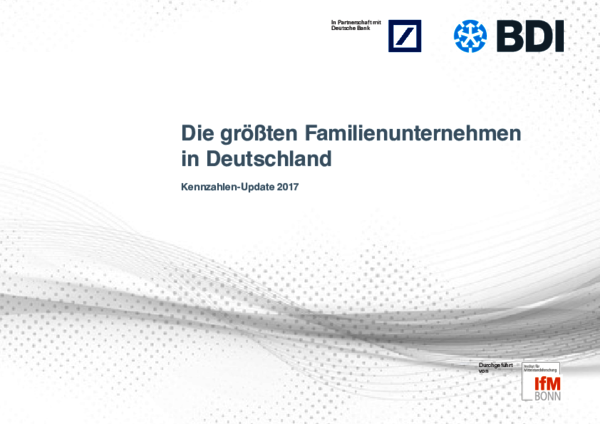External publications
All publications that IfM scientists have published externally are compiled here.
249 Results
External publication | 2018 Women entrepreneurs´ financing revisited: taking stock and looking forward
Do financing agencies discriminate against women entrepreneurs, or is this simply a perception? Does the persistent underrepresentation of women in the financing industry, especially in venture capital, play a role?

External publication | 2017 The largest family-owned companies in Germany, key figures update 2017
As part of the study series "The largest family businesses in Germany", the IfM Bonn analyzed the balance sheet and P&L data of family businesses with annual sales of 50 million euros or more in the fall of 2017.
External publication | 2017 Data security and missing standards in medium-sized businesses
This book contribution examines the question of whether data and legal security as well as the lack of standards and norms represent significant challenges for the realization of Industry 4.0 for manufacturing companies in Germany.
External publication | 2017 SME and Entrepreneurship Policy in Canada
The report provides a comprehensive assessment of the structure and performance of SME and entrepreneurship activity in Canada, the business environment and framework conditions for SMEs and entrepreneurship, the strategic framework and delivery arrangements for policy, national SME and entrepreneurship programmes and the local dimension of the policy.
External publication | 2017 Business Takeover or New Venture? (Why) Do Women Prefer New Ventures?
This paper analyzes the role of (nascent) entrepreneurs’ sex in choosing the mode of business entry. Using a unique data set and estimating logit regressions we show that nascent entrepreneurs’ sex indeed affects their intended and actually chosen mode of entry.
External publication | 2017 Entrepreneurial Ecosystems and Growth of Women´s Entrepreneurship
In this monograph, a renowned group of international authors describes where and in what form gender plays a role in the ecosystem of entrepreneurship.

External publication | 2017 The largest family businesses in Germany - Company Survey 2017
In the context of the study series "Die größten Familienunternehmen in Deutschland" the IfM Bonn has conducted a survey of about 312 of the more than 4,500 largest family businesses in spring 2017 for the eighth time.
External publication | 2017 Driving factors of innovation in family and non-family SMEs
This study examines the extent to which innovation behavior differs between family-run and non-family-run small and medium-sized enterprises (SMEs).
External publication | 2017 [Übersetzen nach: English] Wider Greenwashing: Wie integre CSR-Akteure sich absichern können
Corporate Social Responsibility (CSR) is not only a management strategy that offers opportunities, but also involves risks. For example, opportunism can seriously jeopardize the success of CSR-related policies pursued by companies.
External publication | 2017 Innovativeness and business relationships in women-owned firms: The role of gender stereotypes
The paper examines the connection between business relationships and the innovative power of companies managed by female owners. In particular, it examines how gender stereotypes influence these contacts.
External publication | 2017 On the influence of vocational orientation measures at schools on the career choice behavior of young people
Young people's choice of career is a much-discussed topic, both in school and company practice and in the context of education and labor market policy. Last but not least, it is a popular subject of investigation in pedagogical-didactic research.
External publication | 2017 Context and Entrepreneurial Cognition
Most people have at least a rough idea of what context means. However, the perception of what contexts are based on can vary greatly.
External publication | 2017 Come on out of the ghetto, please - Building the future of entrepreneurship research
The article shows that formerly marginal and now intensively considered sub-areas of entrepreneurship research lead to findings that can be fundamental for a more practical and critical research in the future.
External publication | 2017 The interaction of equity crowdfunding platforms and ventures: an analysis of the preselection process
A growing number of young and innovative companies receive financial support through public calls over the Internet. The associated campaigns take place on specialized platforms that act as intermediaries between founders and potential investors.
External publication | 2017 The demise of a model? The state of collective bargaining and worker representation
This paper examines the development of collective bargaining in the German private sector since 2000, using the company and company history panel of the Institut für Arbeitsmakrt- und Berufsfoschung (Institute for Employment Research) to examine changes in collective bargaining both longitudinally and in cross-section.
External publication | 2017 Do unfair perceived own pay and top managers’ pay erode satisfaction with democracy?
Workers who feel unfairly paid or who feel that the income of managers on the boards of large companies is unfair are less satisfied with the current state of democracy in Germany.
External publication | 2016 The largest family-owned companies - Key figures update 2016
As part of the study series "The largest family businesses in Germany", the IfM Bonn analyzed the balance sheet and P&L data of family businesses with annual sales of 50 million euros or more in the fall of 2016.
External publication | 2016 Economic education as part of general education
Can and should the school teach entrepreneurship? This article examines the question of the importance of entrepreneurship education for the national economy and for future employment.
External publication | 2016 Women´s Entrepreneurship in Global and Local Contexts
All over the world, the phenomenon "entrepreneurship" has developed a high momentum of its own.
External publication | 2016 Everyday Entrepreneurship - A Call for Entrepreneurship Research to Embrace Entrepreneurial Diversity
The authors plead in their contribution for taking a comprehensive and open perspective within the Entrepreneurship Research towards the question, what constitutes entrepreneurship.